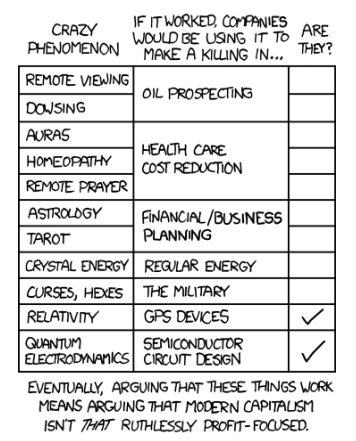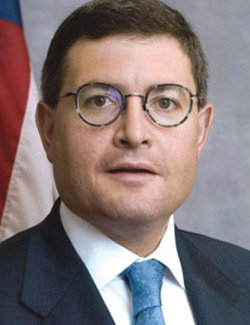While the stolen 2020 election hoax was in full swing, the pillow guy Mike Lindell kept publicly saying that he had rock solid evidence the election was stolen. At one public meeting, he laid out some evidence and promised a $5 million reward to anyone who could prove the evidence was did not prove the 2020 election was stolen. Lindell referred to the challenge as as the “Prove Mike Wrong” contest. In the crowd (small group of people?) at that public event, was Trump supporter Robert Zeidman. Zeidman was a computer programmer and data analyst by profession. Zeidman collected Lindell's evidence and in a couple of hours figured out that Lindell's evidence wasn't even evidence. It was just random stuff having nothing to do with the 2020 election.
Zeidman asked Lindell's company to pay the reward. Lindell's company refused. Zeidman went into arbitration and won. Lindell's company still refused. Lindell's company then filed suit in federal court to get a declaration that the arbitration was bogus and void. Now, Zeidman has filed suit in federal court to force Lindell to pay the $5 million prize, plus interest of 10 percent a year.
A NYT article comments:
“It’s not about payment, it’s wrong. They’re just doing this trying to discredit the evidence and the evidence is all there,” Lindell said in an interview Friday. “We’re taking it to court. It’s just all corrupt.”
The controversy grew out of an offer Lindell made ahead of a “cyber symposium” he held in August 2021 in South Dakota. In public and broadcast appearances, he claimed that he had data showing that the Chinese government had interfered with the 2020 U.S. presidential election, and he said he would pay a $5 million prize to any cyber expert who could prove that the material was not from that election.
Zeidman examined Lindell’s data and concluded that it did not substantiate Lindell’s claims of fraud and in fact had no connection to the 2020 election.
Once can certainly enjoy the crass entertainment of this bizarre fiasco that a crackpot Republican elite is entangled in. But it is very much worth considering that elite, anti-democracy crackpot Republican radicals like Lindell will wind up in powerful positions in the federal government if any Republican candidate wins the 2024 presidential election. Lindell himself likely will be empowered if Trump wins. That thought is not nearly as entertaining.
_______________________________________________________________
_______________________________________________________________
A political action committee to get former Fox News host Tucker Carlson to run for president is making its launch with an ad that praises him for mocking “woke nonsense” — and is aiming to pull the GOP presidential field to the right.
The Draft Tucker PAC, a hybrid PAC that filed paperwork with the Federal Election Commission in late April shortly after Carlson was ousted from Fox News, debuted an ad on Thursday evening that is set for an initial weeklong ad on the conservative Newsmax cable channel next week.
“Republicans need a new leader, and Tucker Carlson is ready to lead,” the ad says. “No one in America is more articulate and pins down leftists in both parties better than Tucker.”
And there are still millions of American adults who believe the Republican Party is merely conservative and reasonable, while vehemently arguing the Democratic Party is radical, socialist, tyrannical and/or pro-pedophilia/cannibalism.
Of all the Republican contenders other than Trump, Tucker probably has the best chance of winning the GOP nomination. What a hopelessly screwed up political party. We are in deep trouble to say the least.
_______________________________________________________________
_______________________________________________________________
The Daily Beast writes about a clever Republican disinformation lie that most of the radical right rank and file has probably internalized and will continue to believe:
Fox News Stoked Outrage Over Migrants Displacing Homeless Vets
It Was a Hoax
Fox News and the rest of right-wing media went wild for a week over a now-debunked story about New York hotels booting homeless vets to accommodate asylum seekers
After right-wing tabloid The New York Post
published the sensational report last Friday, Fox News and Newsmax ran wild with it, devoting dozens of segments (and countless online articles) to the indignation of “people who served our country and need a little boost” getting displaced by “illegals,” all while “these hotels are selling their soul for a check.”
Turns out, however, the whole story was made up.
There we have it. Shameless elite fascist Republican propagandists lie. And lie. And lie.
Fascist Republican dark free speech, it's what's for breakfast. And lunch, supper and snacks. All day, every day.
_______________________________________________________________
_______________________________________________________________
From the Yawn Files: A news article headline says that former Trump White House lawyer Ty Cobb is predicting that Trump will end up in jail as the slower than glacial Mar-a-Lago probe continues.
Yawn. Nap time. That's white noise click bait. When Trump goes to jail, then there will be some news fit to print.
_______________________________________________________________
_______________________________________________________________
Vanity Fair writes:
Ted Cruz Launches Investigation Into Bud Light for Ad Featuring Transgender Influencer, Because No, He Doesn’t Have Anything Better to Do.
It's good to see elite fascist Republican politicians working diligently to solve America's serious, urgent problems. You know, problems like the existence of transgender children and adults who need to be cruelly harassed and oppressed. That will MAGA.
.jpg)


